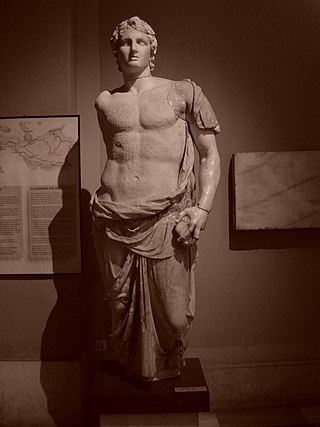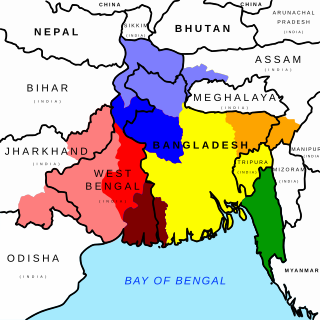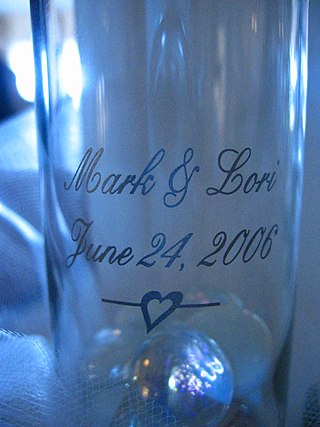Arras is the capital of the Pas-de-Calais department in northern France.
Contents
Arras may also refer to:
Arras is the capital of the Pas-de-Calais department in northern France.
Arras may also refer to:

Alexander is a male given name. The most prominent bearer of the name is Alexander the Great, the king of the Ancient Greek kingdom of Macedonia who created one of the largest empires in ancient history.

A wedding is a ceremony where two people are united in marriage. Wedding traditions and customs vary greatly between cultures, ethnic groups, religions, countries, and social classes. Most wedding ceremonies involve an exchange of marriage vows by a couple, presentation of a gift, and a public proclamation of marriage by an authority figure or celebrant. Special wedding garments are often worn, and the ceremony is sometimes followed by a wedding reception. Music, poetry, prayers, or readings from religious texts or literature are also commonly incorporated into the ceremony, as well as superstitious customs.
A white wedding is a traditional formal or semi-formal wedding originating in Great Britain.

A wedding reception is a party usually held after the completion of a marriage ceremony as hospitality for those who have attended the wedding, hence the name reception: the couple receive society, in the form of family and friends, for the first time as a married couple. Hosts provide their choice of food and drink, although a wedding cake is popular.

An engagement or betrothal is the period of time between the declaration of acceptance of a marriage proposal and the marriage itself. During this period, a couple is said to be fiancés, betrothed,intended, affianced, engaged to be married, or simply engaged. Future brides and grooms may be called fiancée (feminine) or fiancé (masculine), the betrothed, a wife-to-be or husband-to-be, respectively. The duration of the courtship varies vastly, and is largely dependent on cultural norms or upon the agreement of the parties involved.

A wedding cake is the traditional cake served at wedding receptions following dinner. In some parts of England, the wedding cake is served at a wedding breakfast; the 'wedding breakfast' does not mean the meal will be held in the morning, but at a time following the ceremony on the same day. In modern Western culture, the cake is usually on display and served to guests at the reception. Traditionally, wedding cakes were made to bring good luck to all guests and the couple. Nowadays, however, they are more of a centerpiece to the wedding and are not always even served to the guests. Some cakes are built with only a single edible tier for the bride and groom to share, but this is rare since the cost difference between fake and real tiers is minimal.
Ago or AGO may refer to:
The name Battle of Arras refers to a number of battles which took place near the town of Arras in Artois, France:
The first name Konstantin is a derivation from the Latin name Constantinus (Constantine) in some European languages, such as Russian and German. As a Christian given name, it refers to the memory of the Roman emperor Constantine the Great. A number of notable persons in the Byzantine Empire, and in Russian history and earlier East Slavic history are often referred to by this name.
In Albanian and Turkish, Kadri is a masculine given name. In Estonian, Kadri is a feminine given name. The name entered Latvian as the variant of Kadri, Kadrija.
Bougainville may refer to:

A Bengali Muslim wedding includes many rituals and ceremonies that can span several days. In most cases, it starts with the Paka Dekha ceremony and ends with the Bou Bhat ceremony.

Anna is a feminine given name, the Latin form of the Greek: Ἄννα and the Hebrew name Hannah, meaning "favour" or "grace" or "beautiful".
Battle of Havana may refer to:

Albert is a masculine given name. It is derived from the Germanic Adalbert and Adelbert, containing the words adal ("noble") and beraht. It is also less commonly in use as a surname. Feminine forms of the names "Alberta" are declining in use.

Las arras, or las arras matrimoniales are wedding paraphernalia used in Christian wedding ceremonies in Spain, Latin American countries, and the Philippines. The tradition is also followed, with varying names and customs, in other countries and communities bearing degrees of Hispanic influence. Traditionally, in Spain and Latin America, it is made up of thirteen gold coins presented in an ornate box or chest; in the Philippines, it is in an ornate basket or pouch. After being blessed by a priest, they are given or presented by the groom to the bride.

The traditional wedding cord, also known as the wedding lasso, is a piece of wedding paraphernalia used in some Christian Catholic wedding ceremonies. This is actually a representation of a loop of rosary beads made out of white satin or silk. During the wedding proper, this is traditionally formed into a figure-of-eight shape, and then placed around the neck areas of the bride and the groom after they have made their wedding vows, and are already kneeling on pillows for the pronouncement of a wedding prayer. This cord symbolizes lifetime unity or the everlasting union of the bride and groom when they officially become husband and wife, as well as a symbol of marital protection; while the loops formed signifies their love for one another. After the wedding, this marital twine is typically kept by the bride as a wedding souvenir. Use of the traditional wedding cord for weddings is common in Hispanic countries such as Mexico, the Philippines, and Spain.

Bride price, bride-dowry, bride-wealth, or bride token, is money, property, or other form of wealth paid by a groom or his family to the woman or the family of the woman he will be married to or is just about to marry. Bride dowry is equivalent to dowry paid to the groom in some cultures, or used by the bride to help establish the new household, and dower, which is property settled on the bride herself by the groom at the time of marriage. Some cultures may practice both simultaneously. Many cultures practiced bride dowry prior to existing records.

The Arras-class, sometimes known as the Amiens class, were a series of aviso built for the French Navy at the end of World War I.